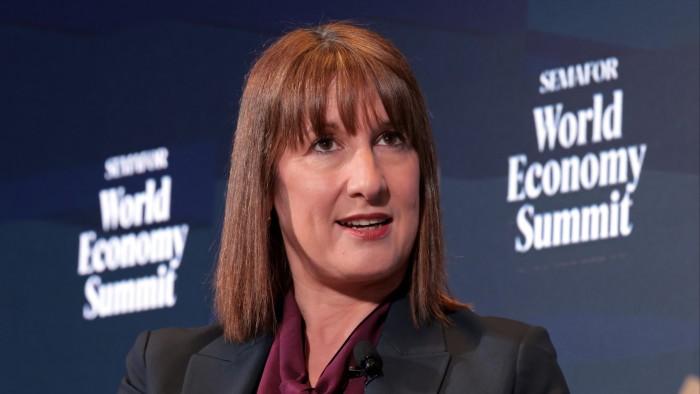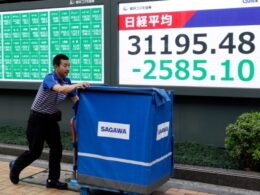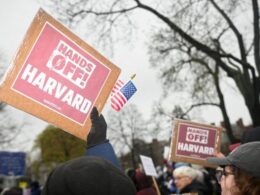Unlock the White House Watch newsletter for free
Your guide to what Trump’s second term means for Washington, business and the world
Chancellor Rachel Reeves has opened the door to a cut in tariffs on US cars exported to the UK as part of a trade deal with Donald Trump, but she insisted Britain would not dilute its food standards or car safety rules.
Speaking in Washington, Reeves told a conference that tariffs went “both ways” in the trading relationship and “I would like to see those tariffs and non-tariff barriers reduced.”
Earlier Reeves told reporters that a deal “can be done” with the US as she prepared to meet her US counterpart, Treasury secretary Scott Bessent, but insisted it would not be at any price.
But she refused to put any timings on the talks, insisting: “We are not going to rush a deal — we will get the right deal which is in our national interests.”
The obstacles to a deal remain considerable, with the US seeking better access to British markets for its farmers. US negotiators have raised the issue with UK counterparts in recent weeks.
Sir Keir Starmer, UK prime minister, said he would insist on upholding “the highest animal welfare standards”, when asked by MPs on Wednesday whether he would lower Britain’s food standards to allow the import of “inferior meat” from the US.
Downing Street said upholding the current ban on hormone-treated beef and chlorine-dipped chicken remained a “red line” in any trade talks with the US, a view echoed by Reeves.
However, Reeves did not dismiss a suggestion that the UK might respond positively to a US request for Britain to cut its tariffs on US car imports from 10 per cent to 2.5 per cent as part of a trade deal.
In response, Britain would expect to see Trump cut his new 25 per cent tariff on UK car imports to America.
One official said the idea, first reported by the Wall Street Journal, was feasible and could be achieved without Britain having to cut tariffs on car imports from other trading partners — particularly China — to comply with World Trade Organization rules.
Asked if the UK was willing to cut its tariffs on US to 2.5 per cent as part of an agreement, Reeves said she would not give a “running commentary” on the numbers.
David Henig, a trade expert, said the US could be given special treatment if the pair negotiated a free trade agreement.
He said that the WTO required FTAs to cover substantially all trade, but he said “it’s not that strong a principle” and was unlikely to be tested.
Annual US car exports to Britain are relatively modest, at $1.4bn, mitigating the industry impact of any reduction in the UK tariff. This is largely because most vehicles sold in the UK are manufactured in Europe, even those from US brands such as Ford.
In its annual country-by-country trade report published this month, the US government singled out the UK’s 20 per cent tariffs on some fish and seafood products, 10 per cent on trucks and cars and up to 6.5 per cent on chemicals as being “high”.
Sir Keir Starmer’s government is coming under mounting pressure from British manufacturers including the car industry to secure an easing of Trump’s barriers given the damage they are doing to key exports.
Mike Hawes, chief executive of the Society of Motor Manufacturers and Traders, said this week that the 25 per cent levy imposed by the US on foreign cars was having a “severe, significant and immediate” impact on the luxury brands that are the UK car industry’s speciality.
Cars are the biggest single UK export item to the US, accounting for sales worth £6.4bn and covering brands such as Bentley, Aston Martin and JLR’s Range Rover.
Reeves said she was under “no illusion” about the challenges posed by the US tariffs, when asked about the auto sector specifically on Wednesday. But she insisted the UK would not dash into a “flawed deal”.
“I’m not going to put a deadline on it — the important thing is to get the right deal rather than rush into a deal,” Reeves told reporters in Washington.
“The strength of our trade relationship, our defence and security relationship, is unrivalled. The US administration, like the UK government, want to build on those strengths and secure an agreement.”
Currently, cars sold in the UK or EU have to meet European safety standards including crash tests that are broadly more stringent than the requirements on vehicles sold in the US.
Reeves said the UK would not ease car safety standards in response to a call from another government.
“We are not going to be changing our standards based on asks from foreign governments. Decisions on food standards, around digital services, around auto standards, are decisions for the UK government to make, and we will continue to do that,” she said.
Reeves declined to discuss the terms of any deal with the US, adding that she would not be discussing the “intricacies” of trade when she meets Bessent.
Additional reporting by Valentina Romei in London
Source link









